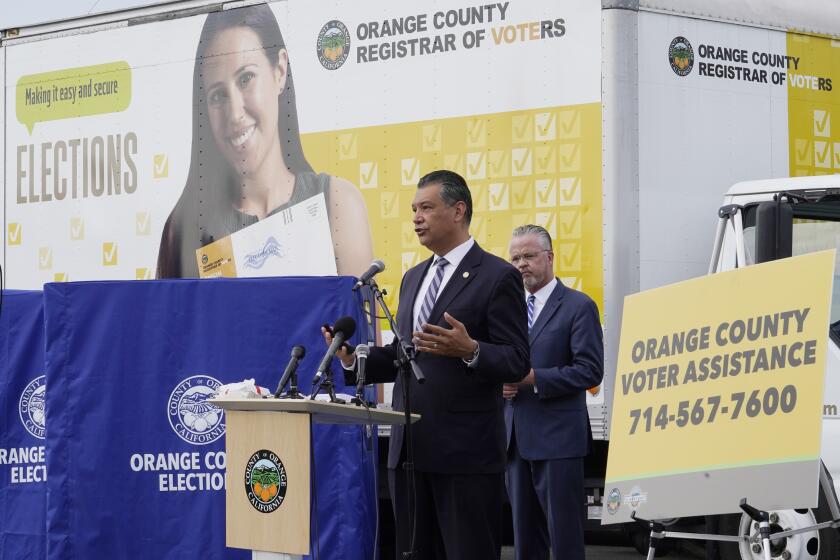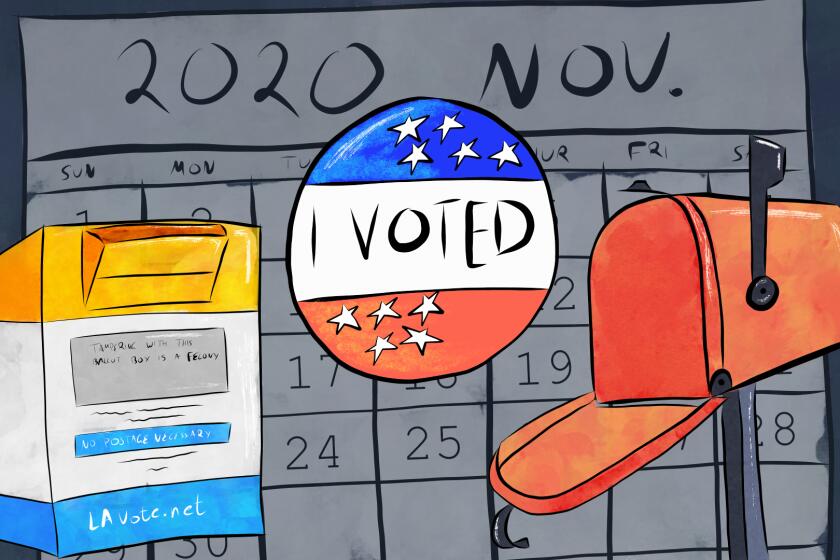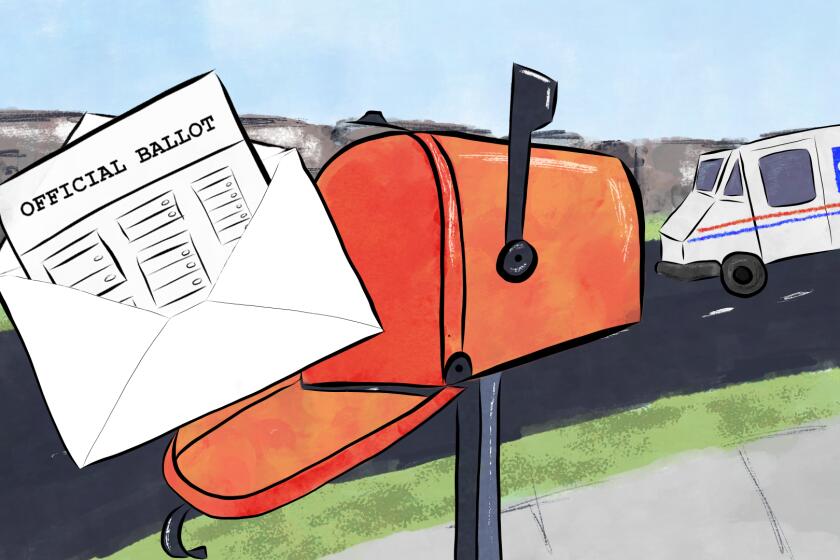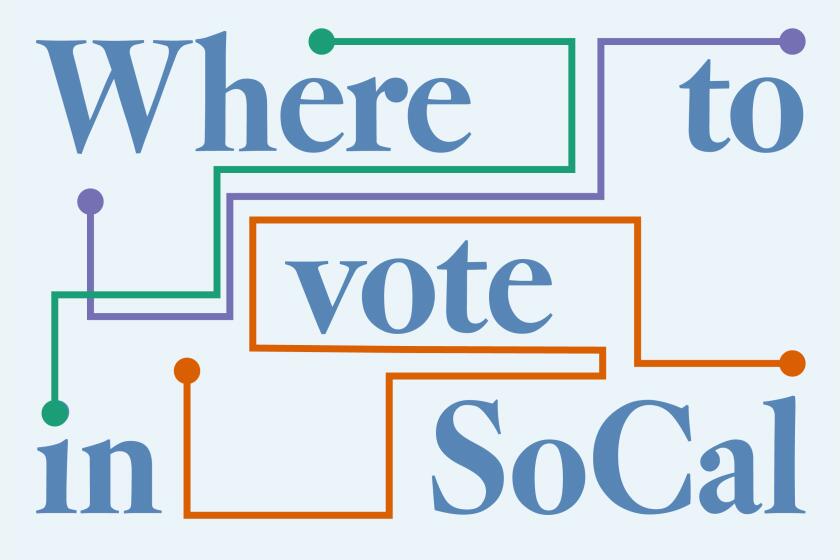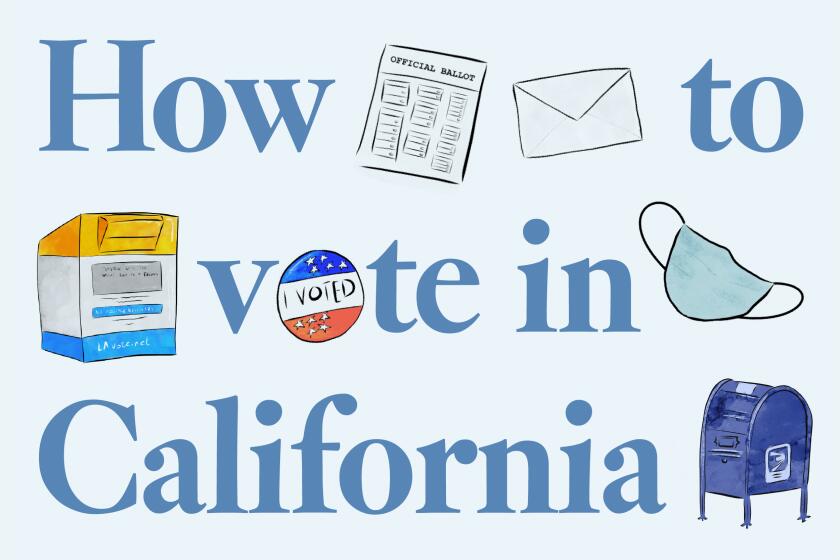California Republicans defend ballot boxes as subpoenas are issued
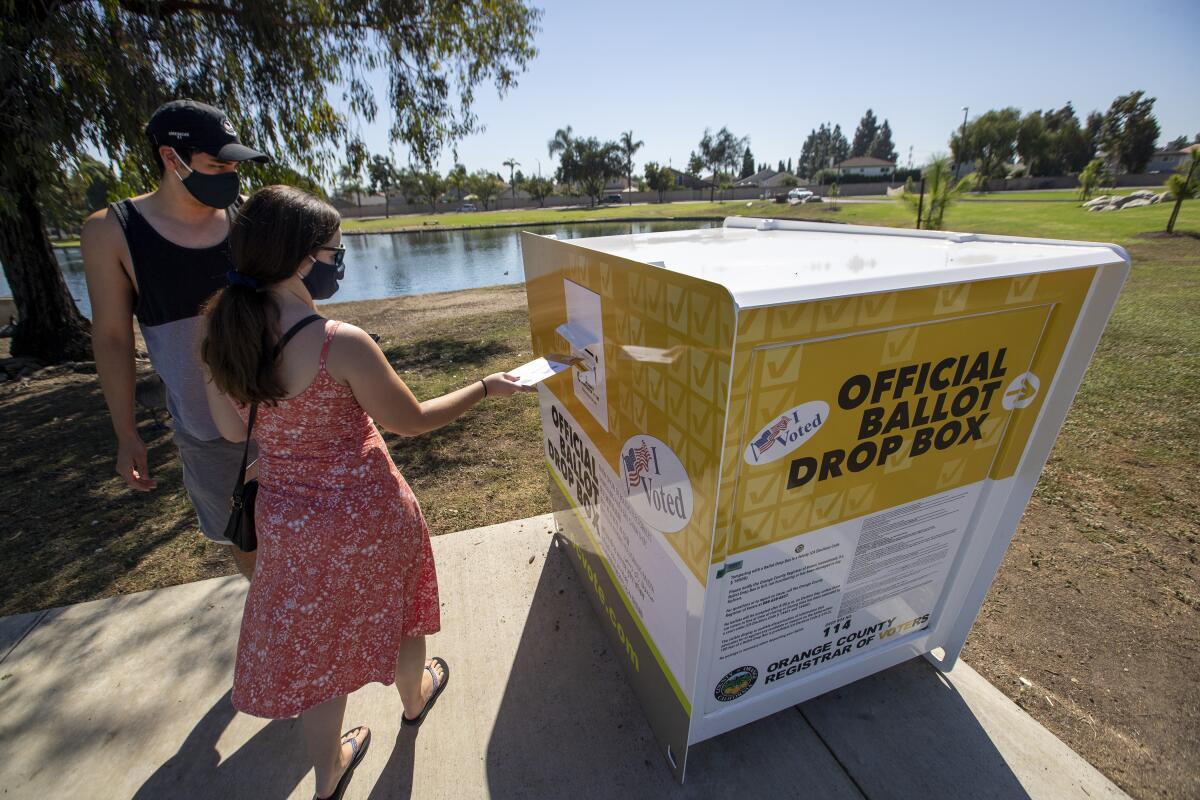
- Share via
California officials on Friday said that the state Republican Party has agreed to no longer deploy “unstaffed, unsecured, unofficial and unauthorized” private ballot boxes and that subpoenas have been issued in an investigation into how the containers have been used in at least three counties.
“The California Republican Party can conduct valid collection activities, but they have to play by the rules and follow state law,” California Secretary of State Alex Padilla told reporters.
But aside from correcting some boxes that were wrongly labeled as “official” locations for dropping off completed ballots, GOP officials continued Friday to insist that their activities have been legal. Party leaders have said they will continue to use the boxes to collect ballots, with staffers overseeing the process and delivering the ballots to county elections offices.
The battle between state officials and the GOP — sparked by revelations over the weekend that Republicans were stationing unofficial gray metal receptacles in Los Angeles, Orange and Fresno counties — has centered over the legality of using third-party collection boxes.
In recent weeks, gray metal containers labeled as ballot drop boxes have been placed at various locations across in several California counties.
California law requires the person collecting a voter’s ballot to fill out the information on the absentee envelope before handing it over to elections officials. State law also stipulates that a mail voter may designate another person to return their ballot.
The bins have confused voters, Padilla said, adding that the Republican Party has “tried to spin their unlawful conduct by playing the victim all week long.”
Should his office receive any indication that state law is being violated, he said, it “will not hesitate to act on it immediately.”
“We are trying to make sure that the law is followed,” Atty. Gen. Xavier Becerra said. “We’re not going to mother, or shepherd them through, every day of activity.”
Late Friday morning, the state Republican Party countered that it has made no concession to the attorney general or the secretary of state.
“In two phone calls with nine attorney general lawyers, they never requested the California Republican Party to do anything except provide information about our program and to turn over records, including names of voters, which we have declined to do,” said California GOP spokesman Hector Barajas.
“This is a thuggish voter intimidation and vote suppression tactic by our Democratic attorney general and secretary of state,” he added.
Republicans assert that they are operating under a 2016 state law that allows an unlimited number of completed ballots to be collected by an individual or political parties and campaigns. State officials argue that the unauthorized boxes are misleading and illegal.
The private bins have raised questions about the chain of custody of the ballots, as well as concerns over the ability to enforce the integrity of elections. The drop boxes were placed at various locations, including gun shops, shooting ranges, churches and Republican Party offices. State election officials say there is a distinction between designating a third party to deliver a ballot for a voter and placing a ballot into an unofficial box.
The dispute adds to growing partisan rancor over allegations of voter suppression and voter fraud in the run-up to the Nov. 3 election.
For years, Republicans have decried the use of so-called “ballot harvesting” as a form of election fraud. A House Republican study raised concerns about “politically weaponized ballot harvesting” in May, decrying the practice as ripe for voter fraud and abuse without offering proof of fraud in California races.
In California, the state’s Republican Party has taken Gov. Gavin Newsom and other officials to court over the practice. In Texas, a federal appeals court ruled this week that the state can limit absentee ballot drop-off spots to only one per county. And last year, a Republican political operative in North Carolina was indicted on felony charges in connection with his alleged involvement in a “ballot harvesting” scheme during the 2016 general election and the 2018 elections. It is illegal in North Carolina for anyone other than the voter, a close relative or legal guardian to deliver a voter’s mail-in ballot.
President Trump waded into the fracas Tuesday evening and again Wednesday morning by retweeting a Times story, urging, “Fight hard Republicans!”
State party officials repeatedly have declined to say how many ballots have been collected from the boxes or to provide details on how many drop boxes are under their supervision and what rules and procedures are being used in the collection and delivery of ballots.
Barajas told The Times earlier this week that “we collect [the ballots], we transmit them, and we have a process that enables us to make sure that they are processed by the [registrar of voters], just like the general public.”
Barajas has said that the party is “looking at potentially expanding” its ballot collecting program.
During a telephone conference Wednesday, the California GOP’s attorney said an “overzealous volunteer” was to blame for putting the word “official” on some of the party’s private drop boxes. Officials said that language was removed from the containers over the weekend.
California Democratic Party Chairman Rusty Hicks said he felt the Republican ballot collection boxes fell short of what the law mandates, citing concerns of security and oversight.
“They’re trying to make the case that a metal filing cabinet is the same as the person,” Hicks said. “I believe what the Republicans are doing is a creative attempt to add confusion to the election.”
State law says that a “vote by mail ballot drop box” should be a “secure receptacle established by a county or city and county elections official whereby a voted vote by mail ballot may be returned to the elections official from whom it was obtained.”
A spokesperson for the attorney general’s office said in an email that lawfully collected ballots may be stored in a number of ways, “but they may not be collected through unauthorized drop boxes.” The term “drop” was emphasized in the email in boldface.
“In other words,” the spokesperson said, “if ballots have been collected lawfully, they may be stored in a secure box as long as they are delivered within three days.”
But in at least one populous county, the mail-in ballot envelope has not included space for a ballot collector’s name and signature since 2016.
“We removed that line and language from the return envelope,” said Scott Konopasek, the assistant registrar of voters in Contra Costa County.
He said the election code language governing the requirement for information from a ballot collector was rendered inoperative once the state removed the rules over who could deliver the document on behalf of the voter.
“Counties don’t do anything with it,” Konopasek said of the information. “Why put crap on the envelope and mislead people?”
In some cases, Republican officials were advised not to distribute the drop boxes. Joe Holland, the registrar of voters in Santa Barbara County, said party representatives contacted his office at least two weeks before the boxes started showing up in Southern California and the Central Valley.
“We said no, don’t do that,” Holland said in recounting the conversation. “We have 30 official drop boxes across the county. If you go to an official drop box, that’s like directly depositing your ballot with a county elections official.”
Holland said two-thirds of the ballots received so far from voters have arrived in the mail. And while he said he doesn’t believe a private box is illegal, it could be considered “unethical.” It was not immediately clear whether any of the unofficial boxes were placed in Santa Barbara.
Elaine Ginnold, the former Marin County registrar of voters, said the GOP’s move is “very risky,” because “they leave themselves open to accusations of tampering with the ballots.”
“Our laws allow somebody to give their ballot to somebody else,” she said. “They’re just taking it, I think, to an absurd extreme.... It’s just not responsible.”
Ginnold added that she was glad state officials have pushed back against the unofficial ballot drop boxes, which she described as a sort of “Wild West” take on election law.
“There are other ways to go about this,” she said.
More to Read
Sign up for Essential California
The most important California stories and recommendations in your inbox every morning.
You may occasionally receive promotional content from the Los Angeles Times.
